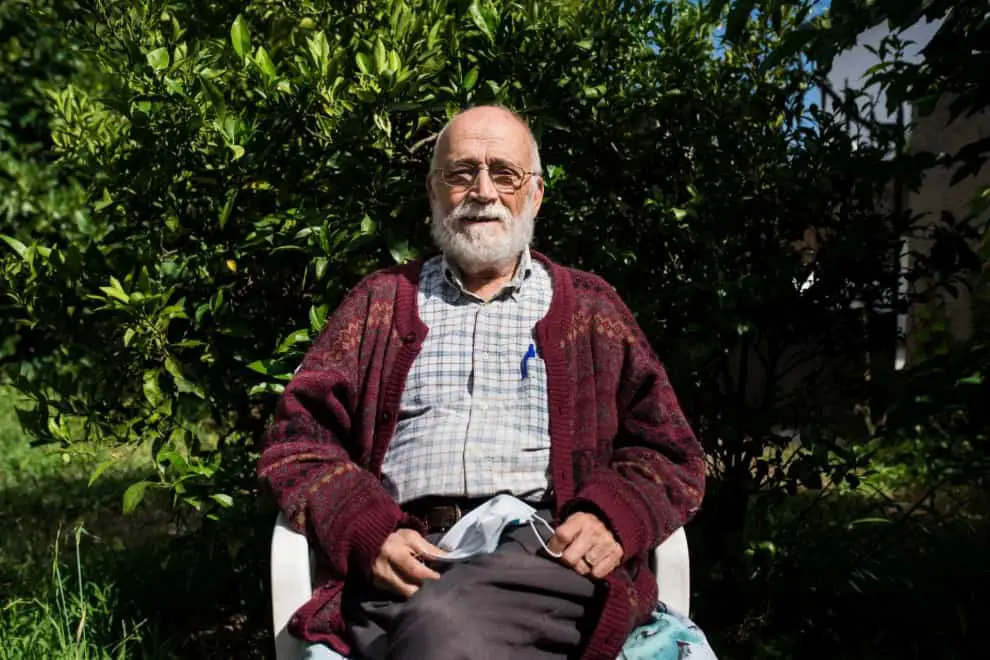An economist deeply critical of capitalism, a convinced humanist, a promoter of the Procés Constituent, an anti-militarist, and a great defender of human rights, he leaves a legacy full of knowledge for a more just, peaceful, and fighting world.
The economist, social activist, and former president of Justice and Peace, Arcadi Oliveres y Boadella (Barcelona, 1945), died this Tuesday at the age of 75 due to pancreatic cancer, a disease that he had been diagnosed with this February. An expert in North-South relations, a convinced humanist, a reference in left-wing struggles, a fervent antimilitarist, a promoter of the Procés Constituent, and a great defender of human rights, Oliveres leaves a legacy full of knowledge for a more just, peaceful and fighting world. “The word coherence is the one I like the most,” he said in the documentary Mai és tan fosc (2014), by Èrika Sánchez, who portrays during 2011 the day-to-day life of the former professor of Applied Economics at the Autonomous University of Barcelona. And it is not strange, that he chose this word: He never stopped being critical of economic and political power, either from his critical economic perspective or from pacifist activism.
Oliveres received numerous tributes, among them the Medalla d’Or al Mèrit Cívic from the Ajuntament de Barcelona (2019), the Alfonso Comín International Award (2011), and the ICIP International Per la Pau Award (2017). Despite his great social and political influence, and although he supported some political parties more closely linked to social movements, he was uncompromising: he never wanted to touch power.
His gentle but tenacious character and his kindness in sharing knowledge and hugs led his family to open a web portal weeks before his death so that people could send him messages. “Aware that he has traveled with many people, his family has created a website to convey the messages you want to send him. Thus Arcadi, while he can, will read to you,” said his niece Victòria Oliveres on Twitter.
A life of struggle and in defense of social justice
Born to the left of Barcelona’s Eixample, his struggle began in 1962 and 1963, when he participated in the creation of the Sindicat Democràtic d’Estudiants de la UB, as well as in Caputxinada, in March 1966. 1968 was also a key year for Oliveres: he graduated in Economics from the University of Barcelona, and it was when he came face to face with Franco’s repression, as he was prosecuted by the Public Order Court (TOP) and tried for clandestine assembly. He was acquitted, but thanks to the favorable reports of the dean of the Faculty of Economics and the defense of the lawyer Francesc Casares and Potau.
His transformative vocation was also intertwined with a progressive Christianity at the hands of Pax Christi, where the culture of peace is promoted, and Justícia i Pau, a human rights defender entity which he entered in 1981 and which he presided from 2001 to in 2014. Precisely from these two platforms, in addition to others, the first campaign against the death penalty was launched in Spain in 1975, to prevent, among others, the murder by the Franco regime of Jon Paredes Manot, “Txiki”, or Salvador Puig I Antich through the intercession of the Vatican. Unfortunately, the mediation had no effect and they were murdered. The repression did not end with the death of Franco, since in 1976 Oliveres was arrested by the Spanish Guardia Civil La Sénia and spent three days at the police station, as a result of his participation in one of the columns of the Marxa de la Llibertat, organized throughout Catalonia by Pax Christi.
Thus, faith did not take away his critical spirit in the face of any power, whether divine or earthly: he participated in dozens of campaigns, including the one that supported the establishment of 0.7% of GDP for development aid, the campaign to support the Fiscal objection to military spending and the constitution of the Assembly of Fiscal Objectors (1983) or the campaign against the law regulating conscientious objection and in support of insubordination (1984).
He also made hundreds of talks around the world to disseminate a critical economy against capitalism, highlighting the exploitation of resources from the North to the countries of the South. Author of the books North-South, diagnosis and perspectives (Fundació Bofill, 1989) and Who owes whom? Ecological debt and external debt (Icaria Editorial, 2004), also participated in the great campaign for the cancellation of external debt and the promotion of ethical banking in Catalonia. “It is evident that the capitalist system cannot be endured. It is a criminal and murderous system that we have to destroy a lot,” he said bluntly in a recent interview with Public.
Another of the main characteristics of Oliveres was his fierce struggle for a peaceful revolution and from civil disobedience, as well as his fierce criticism of government relations with the arms industry. In this sense, he was a great objector to Spain’s entry into NATO in 1986, although finally the socialist Felipe González made the State join the organization. In fact, he has published books harshly criticizing Spain’s relations with arms, such as The Arms Circle in Spain: A Critical Overview 1989-1999 (Icaria Editorial, 2001), a publication that he made jointly with the activist and researcher member of the Center d ‘ You study for Pau JM Delàs Pere Ortega.

